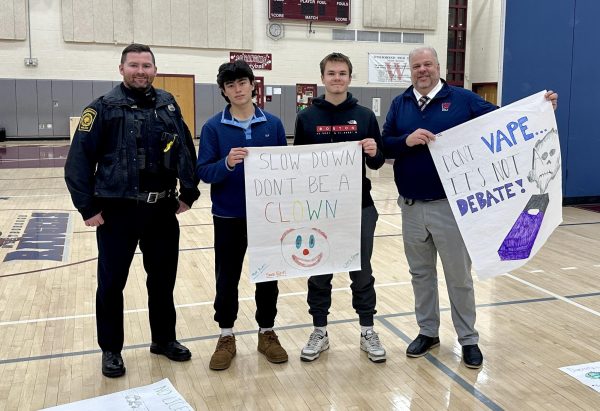Destigmatizing Mental Health in School Culture
April 26, 2022
Warning: This article discusses mental health topics that may be triggering and/or sensitive to some.
Social norms and expectations play a role in defining mental health disorders and creating a stigma of embarrassment and shame surrounding them. There continue to be many misconceptions and stereotypes surrounding mental health. The truth is, Everyone has a baseline mental health experience and that can vary over the course of a person’s life. Depending on the severity of a person’s experience can lead to a mental health diagnosis. In addition, mental health is not only anxiety or depression. “Mental health is the overall wellness of how you think, regulate your feelings and behaviors.” and, it can look different for everyone. For instance, you may experience excessive worrying, extreme feelings of guilt, withdrawal from friends and activities, Significant tiredness, low energy, or problems sleeping, according to mayoclinic.org. When people struggle with their mental health, frequently it tends to interfere with relationships, schoolwork, and their health and wellbeing.
A WHS sophomore student shares, “Yes, I would say that I am uncomfortable or embarrassed about my mental health. It’s not something I openly talk about, because I don’t want to have that label of someone who is just saying they are depressed or have anxiety, especially because I am not diagnosed. I also have a fear of being looked down on because of the state of my mental health.”
It’s important to note that at the end of the day, we have all struggled with our mental health at some point in our lives. Instead of shaming or judging people for their mental health, we should educate ourselves, join conversations about the stigma, and support those around us.
A different WHS student shares what would make them feel more comfortable reaching out for help, “If it was talked more about. I just think it isn’t. We have the screening at the beginning of the year but no one ever really brings it up again or hears about it. I don’t know, I just feel like it’s not acknowledged much at school.”
Mental Health Crisis:
Although we may be leaving the COVID pandemic, the world has entered a mental health crisis, that continues to surge. According to apa.org, “More than 8 in 10 (84%) psychologists who treat anxiety disorders said they have seen an increase in demand for anxiety treatment since the start of the pandemic, compared with 74% a year ago. Demand for treatment of depression is also up, with 72% of psychologists who treat depressive disorders saying they have seen an increase, compared with 60% in 2020.”
Additionally, referring to the worsened conditions people have been experiencing with their mental health, Kelly Roberts, Director of Graduate Programs in Human Sciences at Oklahoma Christian University in Edmond shares, “It’s the worst it’s ever been… I’ve never seen it like this.”
There are waitlists after waitlists for therapists and psychologists, showing the high demand people have and people worldwide are having/seeking help. There is a constant obstacle for those trying to find a therapist near them, even one they could meet with over Zoom.
For instance, The Washington Post featured a story about Angelle Haney Gullett who lost her father in September. She knew she would need grief counseling, and she contacted 25 therapists in the Los Angeles area, however, none of them would accept a new client. Another story from the article talked about “24-year-old Rowan Welch, a team leader for a bank, said he has contacted every provider within 50 miles on his insurance plan’s network without success” (Bernstein 2022). The full story is linked here.
These are two examples of the struggle that many people are experiencing when they seek to support, but unfortunately, rather than being outside of the norm, these experiences are the new norm.
My experience:
Personally, I disregarded my mental health and assumed that the whole idea of mental health didn’t apply to me. However, throughout high school, I have realized that mental health is natural and can look different for everyone. Trying to be the best student, athlete, friend, daughter, etc., all at once, took a toll on me. Once I was able to recognize my emotions, and the toll that pressure and stress were taking on me, I was able to assess my habits and focus more on self-care. I helped myself by talking about issues I was facing, and my stressors with my parents, coaches, and friends, and they were able to help me.
I am sure my situation is similar to many other students here at WHS. Students undergo a lot of stress daily, which stems from the high-pressure environment that school is in. Some may not realize or understand the toll their mental health takes on them. At the same time, students need to understand that their mental health is just as if not more important as their academics.
Mrs. Glenn (WHS social worker) recommends that students strive for balance in all aspects of their lives! She says whenever you are feeling stressed or overwhelmed: slow down, take a few deep breaths, and do something kind for yourself that is going to allow you to make a balanced and positive choice for moving forward.
Reaching Out
Similar to physical health or injuries, if left untreated or ignored, your mental health problems can turn into bigger problems, and interfere with other parts of your life now and even in the future. All in all, It’s ok and important to reach out for help if needed. A lot of people struggle with their mental health at some point in their lives; you are not alone, and there are many people around you that support and care about you! Whether you notice this in high school or not, reaching out and engaging with professionals is the best first step.
Here are some resources and safe spaces here at WHS that many people may not recognize: School Counseling, School Adjustment Counselor, CSS, and School Psychologists. Additionally, the SEL Moments that are being offered in classrooms now are a great way to check-in with yourself to see how you are managing your emotions and stress load. If you are noticing during these SEL Moments or in any area of your life that you are feeling overwhelmed, or that the issues discussed may apply to you- this is a great first sign to reach out to your School Counselor to talk!
All in all, it is important that awareness is spread about the importance of mental health, and that mental health is destigmatized. This can be done by educating yourself and others, talking openly about mental health, being conscious of your word choice, and being understanding, supportive, and respectful of your classmates.
If the mental health culture in school is going to change, then all students and faculty at WHS must work to spread awareness about mental health and be supportive of those struggling with their mental health.
If you or someone you know is struggling, here are some resources to consider reaching out to at any time in your life:
- Crisis Text Line: Text HOME to 741741
- Lifeline: 24/7, free, confidential support – call 800-273-8255
Sources:
https://www.ncbi.nlm.nih.gov/pmc/articles/PMC5007563/
https://www.mayoclinic.org/healthy-lifestyle/adult-health/in-depth/mental-health/art-20044098














